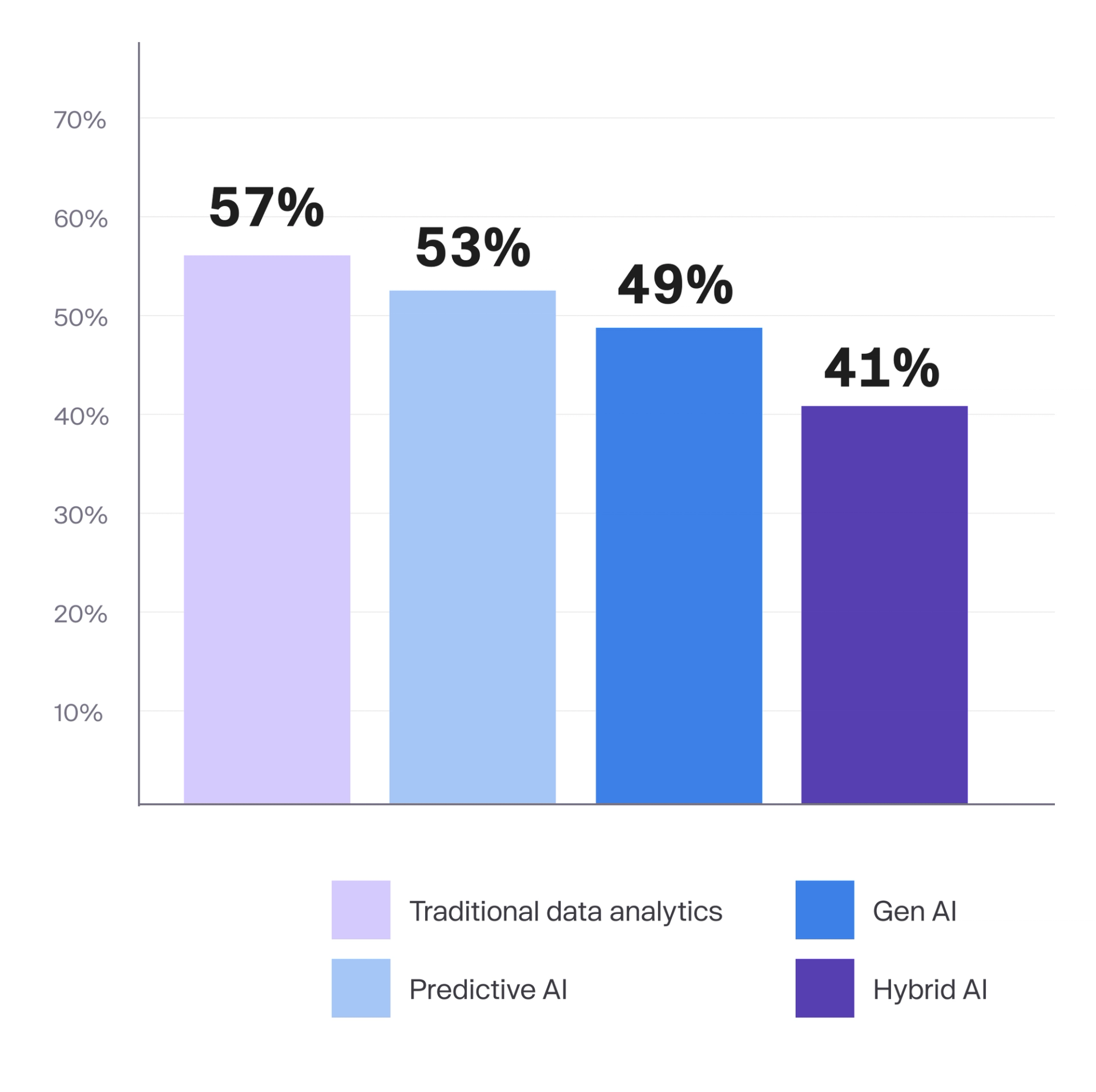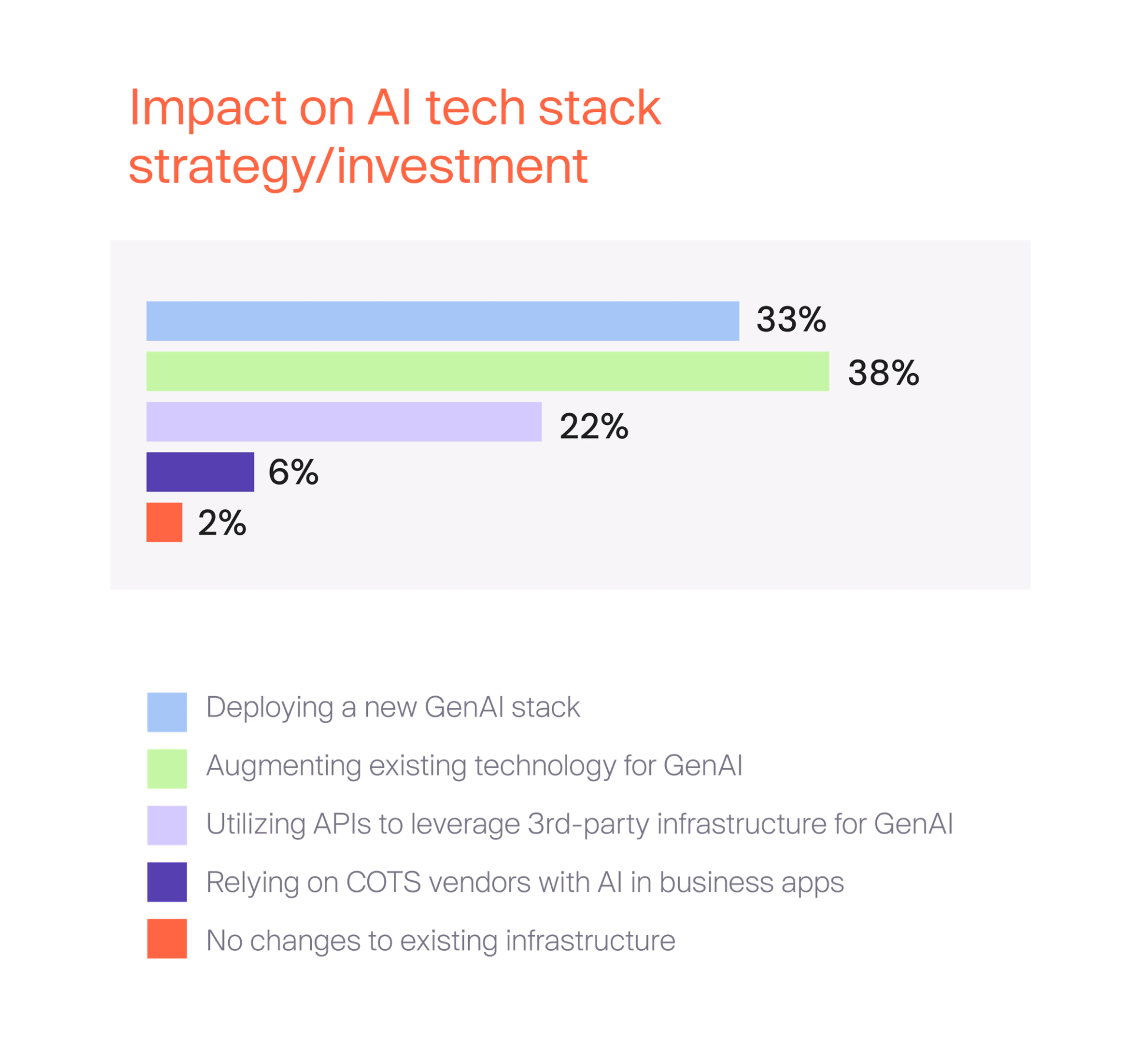Survey reveals AI's real-world priorities: GenAI isn't the whole story
Domino2024-08-22 | 7 min read

Eighteen months after ChatGPT stole the world’s attention, enterprises are grappling with surging enthusiasm for AI. But where are today’s enterprises across the globe actually placing their AI bets, and how are they preparing for tomorrow? We took a look, and the results may shock some: the response to today’s AI enthusiasm is not all about generative AI (GenAI).
To help enterprise AI leaders better understand their peers’ real-world priorities and concerns over the rapidly evolving AI domain, Domino Data Lab commissioned BARC to survey 278 enterprise AI leaders globally about how their companies are deploying AI in the real world, the support they get, and their leading concerns. The results show that while GenAI may be stoking AI enthusiasm and even budgets, today’s real-world AI initiatives and their underlying stacks are still diverse, rapidly evolving, and far from perfect for addressing today’s infrastructure and governance challenges.
Boards are all-in on AI, with traditional workloads still the workhorse
When it comes to enterprise attitudes on AI, one thing is for sure: corporate boards are all-in. 21% of enterprises have a blank check from the board for all types of AI. Additionally, nearly all boards are paying attention to AI. Only 5% of respondents said their board hadn’t engaged or set a strategy on AI, and 72% reported their boards provided sufficient support for all AI, including GenAI.

However, the research revealed that some boards may be overly excited by GenAI. A third (34%) of respondents said GenAI initiatives get more board support than they deserve, depriving support from other forms of AI. 8% said it was difficult to get funding for anything other than GenAI.
While attitudes are solid and often very focused on pushing GenAI, actions are more varied. Companies are rapidly putting GenAI into production, but more traditional forms of AI and data analytics remain the workhorse. Slightly more companies, 53% and 57% respectively, are putting predictive AI — i.e. machine learning — and advanced analytics projects into production than GenAI (49%). However, the distinction between these types of projects is blurring. 41% of leaders say that they have projects that use both predictive and generative AI in production.
This survey also found that enterprises are still early in their AI journeys. Over half of respondents are still in the planning, researching, or proof of concept stage when it comes to GenAI, and 47% have not yet put predictive AI projects into production even though these technologies have been available for decades — an indication that companies still struggle to move from experimentation phases to productizing all types of AI.

Everyone needs to upgrade AI governance
If companies are indeed amidst a rapid AI deployment spree, then this comes with the need for robust governance frameworks and scalable infrastructure to support these advanced technologies. The study found that 95% face a governance remodel or reboot to update their frameworks and processes for today’s modern model landscape.
Reassuringly, most companies say they have a baseline of necessary responsible AI infrastructure and processes in place. They believe that they can incorporate more data sources and more data into the AI equation. Most (65%) of our respondents said their companies need to only add new processes to existing governance frameworks to compensate for this change.
For other companies, GenAI requires a more profound revision of their governance plans. Nearly one in five (18%) say they will entirely rewrite their governance frameworks to address the advent of GenAI. 12% of enterprises plan to replace their current governance framework entirely due to GenAI.

Compute scarcity — a myth?
Securing access to today’s most advanced GPUs may seem like trying to book a table at the trendiest restaurant in town — high demand, limited supply, and fierce competition. However, our survey shows that, at least today, not many companies are hindered by compute scarcity and most are confident in leveraging their AI stacks across various vendor silicon and infrastructure. Despite the scarcity of some top-of-the-line GPUs, 9 out of 10 companies (92%) say compute scarcity, considering the full gamut of GPUs and CPUs, is not impacting their needs to scale AI.

Adapting to a world of complete AI
Finally, we asked AI leaders how the arrival of GenAI impacts their strategies for broader AI stacks: infrastructure and tooling. While 98% of enterprises plan to make some infrastructure adjustments to account for the addition of GenAI to their AI journey, results show they are pursuing a diverse range of approaches to support the complete range of AI:
- 38% are powering their GenAI initiatives by augmenting their existing AI stack.
- 33% are investing further, deploying a new stack entirely for GenAI.
- 22% are simply turning to cloud providers or other third-party APIs to access third-party infrastructure for GenAI for capabilities such as inference.

AI strategies in EMEA: Caution over hype
As GenAI reshapes the AI landscape, enterprises in EMEA are taking a more cautious and measured approach, reflecting unique regional challenges and regulatory considerations. Interestingly, respondents in EMEA are nearly twice as likely (47%) than their North American counterparts (31%) to keep their existing AI stack as a result of GenAI’s arrival. Perhaps this is because EMEA AI leaders were less likely to rate their boards’ support for all AI as sufficient (66% of EMEA respondents vs. 77% of North American respondents).
Also, in a possible reaction by companies now subject to the new EU AI Act, nearly double the percentage of EMEA respondents (16%) indicated that they would fully replace their current governance framework in the era of GenAI, compared to just 9% of respondents in North America.
Interested in learning more? Download the full report here.
Domino Data Lab empowers the largest AI-driven enterprises to build and operate AI at scale. Domino’s Enterprise AI Platform provides an integrated experience encompassing model development, MLOps, collaboration, and governance. With Domino, global enterprises can develop better medicines, grow more productive crops, develop more competitive products, and more. Founded in 2013, Domino is backed by Sequoia Capital, Coatue Management, NVIDIA, Snowflake, and other leading investors.



